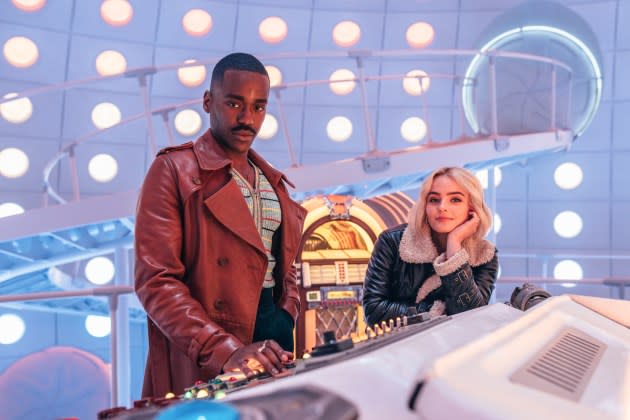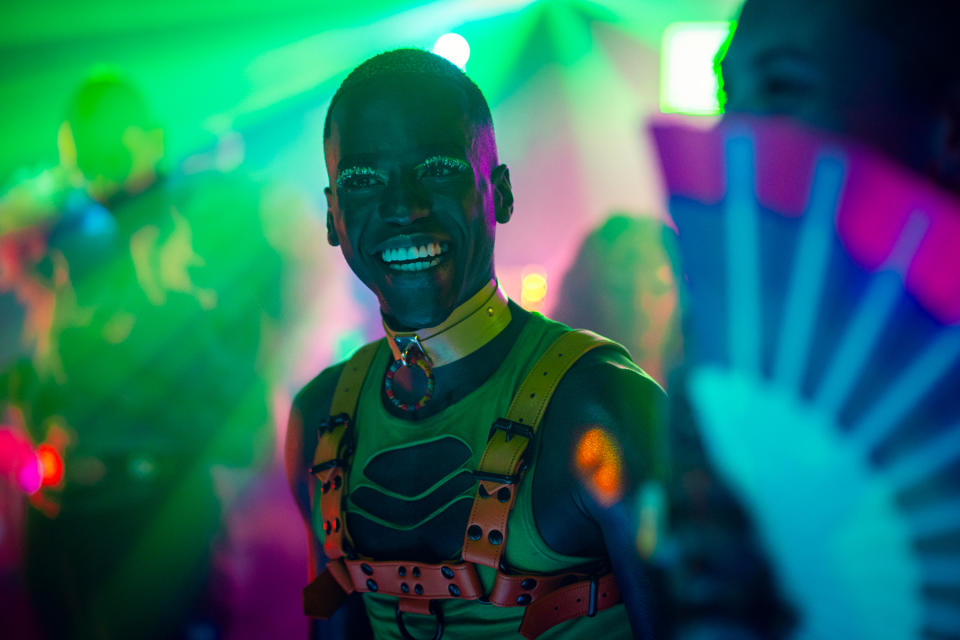‘It’s About Time’: Ncuti Gatwa on Becoming the New Face of ‘Doctor Who’

The first thing you notice about Ncuti Gatwa is his smile. Whether as a young, anxious queer teen in Netflix’s Sex Education, one of the many Kens in Barbie, the latest actor to play the lead character in Doctor Who, or even on a slightly pixelated Zoom screen, when Gatwa flashes those pearly whites, it is impossible to look at anything else. His expression radiates joy so pure and uncut it’s as much a superpower as the Doctor’s ability to travel through time or regenerate into new forms.
It’s also exactly what Doctor Who producer Russell T. Davies was looking for when he began creating this 15th Doctor, long before Gatwa came in to audition. In 2005, Davies revived the British sci-fi TV institution from an extended limbo and ran the show for several seasons with Christopher Eccleston and David Tennant as the ninth and 10th Doctors, respectively — one grief-stricken, the other quippy but wounded — then passed the torch to other writers, and other Doctors.. Upon taking the reins again last year, he decided that the present moment called for a different kind of Doctor.
More from Rolling Stone
“I was thinking about what a terrible world it is now, and how many stresses of mental health there are in young people,” says Davies. “I wanted a hero who wasn’t closed, who wasn’t all stiff upper lip. And [who] wasn’t swaggering or butch, either. When children are feeling scared of the future, and when they’re on TikTok laughing hilariously with their friends, the life of a young person, I think, is bigger and madder and wilder and richer than it was when I was young, where we just sat there and went to school. So I wanted a hero who felt more. And at the same time as that (thought), along comes Ncuti, and bless you, you could not hide your emotions for a second in performance.”
At 31, the Rwandan-Scottish Gatwa isn’t the youngest actor to play the role (Matt Smith was 28 when he succeeded Tennant), but his emotions may be more palpable than any of his predecessors, going all the way back to William Hartnell in 1963. The Christmas 2023 special featuring his first full-length adventure begins with his Doctor crying in a tight close-up; when his new companion Ruby Sunday (Millie Gibson) sees him for the first time, he is exuberantly dancing in a club, wearing a tight tank top and kilt. The delight Gatwa projects onscreen is also a reflection of how it feels to take on a character who may be second only to James Bond in British pop-cultural identity.
“I don’t know whether you can quite put it in words,” Gatwa says. “They are a character that we’ve grown up knowing and that most people in this country have had the show passed down to from someone. It’s like your favorite piece of furniture in your house. It’s something that you’ve always known and loved to be there, and then you’re going to pass it on to someone else. It feels really cool.”

It’s a huge leap in visibility for Gatwa, whose family moved to Scotland when he was two to escape the Rwandan genocide. He struggled with racism and loneliness while growing up in a foreign land. He was on the verge of quitting acting due to a lack of money when he landed his breakthrough job on Sex Education, in which his character Eric Effiong’s journey toward embracing his sexuality and finding a place within both his religious family and his church instantly made him an icon for queer teens. (He had 500 Instagram followers right before the show debuted; he has nearly 3 million now.) Naturally baby-faced, he sports a thick leading-man mustache most of the time to look older. He shaved it to play Eric, then had to wear a false one for his first two months of portraying the Doctor.
“The show evolves and regenerates. For all you damners out there, I’m not going anywhere.”
Tennant and Catherine Tate returned for a trio of specials at the end of 2023 to mark the franchise’s 40th anniversary, but Disney+ is presenting Gatwa’s first season, which launches on May 10, as Doctor Who Season One, much as the BBC did in 2005, akin to the periodic fresh starts the franchise has taken.
“Who is interested in Season 67, or whatever it is?” asks Davies. “It genuinely starts again. The reason why it’s survived for all these years is that every so often, Doctor Who stops, opens the door and refreshes itself, and gets a new audience in. And there are children who will come and watch this, who will be me in 20, 30, 40 years time making this stuff.” The focus will primarily be on new stories and characters, rather than replaying the series’ greatest hits over and over. (Though Tennant’s Doctor uncharacteristically survived the introduction of Gatwa’s, Davies says not to expect him or Tate to appear again: “That was their ending.”)
Perhaps the freshest start of all is that Gatwa is the first Black actor to play the Doctor, which will be a big change for legacy viewers — though not necessarily for children in the series’ target demographic.
“If you’re a six-year-old boy sitting there in Brixton, it’s like, ‘That’s the Doctor,’ ” argues Davies. “They don’t think through all this stuff. They don’t read headlines. If they go online, they’re finding the spiciest chicken wing on YouTube. They’re not bothered by this.”
Still, Davies understands the necessity of hiring an actor of color to play this iconic role. “It’s about time,” he says. “Sometimes, big old terrestrial and streaming shows can be slow machines to catch up with the world. And I’m getting older now, so you become one of those gatekeepers of television, for want of a better word, and your job is then is to hold the gate open: ‘Come on, everyone!’””
“That’s what the show does,” agrees Gatwa. “It evolves and it regenerates. I feel like it’s about time, and I am here. For all you damners out there, I’m not going anywhere.”
Gatwa is also openly queer. So is Davies, who has spent much of his career telling LGBTQ+ stories, from the original Queer as Folk to the AIDS epidemic miniseries It’s a Sin. He says Doctor Who auditioned performers of every race, gender identity, and sexual identity before Gatwa was chosen, and that this feels less momentous to him and his new star than it may to viewers.
“I don’t walk around thinking all day about being queer, and, What’s my queer energy today?” says Davies. “You’re talking to people who live a queer life. So this is completely normal. And where I’m slightly amazed is that anyone finds this different. Come on straight people, come and find out!”
Both are also careful to point out that concepts like sexuality don’t even apply to the Doctor, and that, while he’s surrounded by lots of men in the club dancing scene, there are an equal number of women.
“I am reluctant to apply any human label to the Doctor,” says Gatwa, “because they’re an alien. They’ve been with all sorts. That is label-less and limitless, and I think it represents our ability to be limitless and our ability to be anything. And that character can be anyone and played by anyone. I feel very, very honored that I get to be the first of a couple of things. Because I think if you’re a true fan of the show, you understand that. You understand that [Doctor Who] lends itself to inclusivity and to diversity and welcoming different people in. That’s what Russell has done. I’m very happy to be a part of that vision.”
Doctor Who has always been socially progressive, but the commentary this time around seems even more pointed than Davies’ last stint. The Doctor’s trusty sonic screwdriver has been redesigned to resemble a remote control or flip phone, because Davies worried that the old sonic looked too much like a gun, which would encourage kids to pretend to shoot at one another. A recent special gave beloved Doctor Who character Donna Noble a nonbinary child, whom she fiercely defended against transphobes. (An all-powerful villain in an upcoming episode is also nonbinary.) “Space Babies,” the season premiere, offers up the adorable title characters in abundance, but also functions as a clear metaphor for governments that try to control reproductive rights without worrying about what happens to children after they’re born.
“If you’re not writing that [in 2024], what on Earth are you doing?” argues Davies. “I think our rights are in danger. I’m talking as someone who’s lived through gay liberation, all the way through the AIDS crisis, all the way through to the freedoms that we have now. I can see them spinning and being endangered, so there’s no choice in this. And if the most exciting and entertaining action-adventure show on television can also do that, I think that’s wonderful.” (Gatwa responds to this speech with an exaggerated snap, cracking up both men.)
Into this fragile moment steps Gatwa, who was 12 when the Davies revival began. “It just felt so cool that this was a show that we had on British TV and it was fantastical, and that we had this mad adventure once a week,” he recalls. Tennant was the Doctor he grew up on, and he credits Tennant’s Hamlet for the Royal Shakespeare Company as the reason he studied drama at the Royal Conservatoire of Scotland: “That DVD formed my perception of what a true actor is,” he says. While sharing scenes with Tennant in one of the specials, he says, “I felt like I was in Inception. It was just like a dream in a dream. For me to have generated from my Doctor, who also is the man that inspired me? Then he introduced me to the TARDIS for the first time, and it was like, the universe is doing some great magics here.”
The premiere of his first season as the Doctor is another huge moment in a year that’s already included him dancing at the Academy Awards as one of the Kens in Ryan Gosling’s show-stopping performance of “I’m Just Ken” — an experience Gatwa describes as a “very dazzling Technicolor pink whirlwind of a dream.” Tennant and Jodie Whittaker (the first female Doctor, a milestone that came with its own baggage) both warned him that however big a deal Gatwa thought being the Doctor was, it’s much, much bigger.
“[Tennant] was so lovely and generous in giving advice for on and off-screen,” he says. “He prepared me for the intensity of the show, which I had been downplaying: ‘Yes, I understand that it’s a huge show, I understand that, but I don’t think it’s going to be that big news, really.’ And then it bloody well was. I thought, ‘Oh my gosh.’”
It seems, though, that he already knows what it’s like to play a character the audience invests very, very deeply in. Asked about one point of similarity between the Doctor and Eric, he hesitates, makes sure to note during a lengthy answer that Eric was a child while the Doctor is thousands of years old, then emphatically jokes, “Eric is gone. Just to let everyone know, Eric is gone. He’s dead! He’s not here anymore. It’s all about the Doctor now!”
Davies, older and more PR-savvy, warns him, “The headline for this in Rolling Stone will now be, ‘Eric Is Dead!’ ”
An unfazed Gatwa flashes one more dazzling smile and replies, “ ‘And the Doctor lives.’ Let that be the headline.”
Best of Rolling Stone
Solve the daily Crossword

